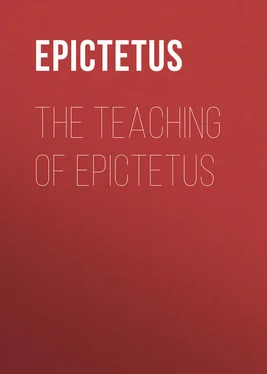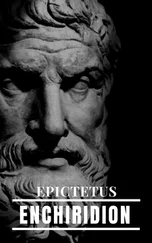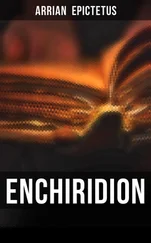Epictetus - The Teaching of Epictetus
Здесь есть возможность читать онлайн «Epictetus - The Teaching of Epictetus» — ознакомительный отрывок электронной книги совершенно бесплатно, а после прочтения отрывка купить полную версию. В некоторых случаях можно слушать аудио, скачать через торрент в формате fb2 и присутствует краткое содержание. Жанр: Философия, foreign_antique, foreign_prose, на английском языке. Описание произведения, (предисловие) а так же отзывы посетителей доступны на портале библиотеки ЛибКат.
- Название:The Teaching of Epictetus
- Автор:
- Жанр:
- Год:неизвестен
- ISBN:нет данных
- Рейтинг книги:5 / 5. Голосов: 1
-
Избранное:Добавить в избранное
- Отзывы:
-
Ваша оценка:
- 100
- 1
- 2
- 3
- 4
- 5
The Teaching of Epictetus: краткое содержание, описание и аннотация
Предлагаем к чтению аннотацию, описание, краткое содержание или предисловие (зависит от того, что написал сам автор книги «The Teaching of Epictetus»). Если вы не нашли необходимую информацию о книге — напишите в комментариях, мы постараемся отыскать её.
The Teaching of Epictetus — читать онлайн ознакомительный отрывок
Ниже представлен текст книги, разбитый по страницам. Система сохранения места последней прочитанной страницы, позволяет с удобством читать онлайн бесплатно книгу «The Teaching of Epictetus», без необходимости каждый раз заново искать на чём Вы остановились. Поставьте закладку, и сможете в любой момент перейти на страницу, на которой закончили чтение.
Интервал:
Закладка:
CHAPTER VII
to the learner
1. Remember that pursuit declares the aim of attaining the thing pursued, and avoidance that of not falling into the thing shunned; and he who fails in his pursuit is unfortunate, and it is misfortune to fall into what he would avoid. If now you shun only those things in your power which are contrary to Nature, you shall never fall into what you would avoid. But if you shun disease or death or poverty, you shall have misfortune.
2. Turn away, then, your avoidance from things not in our power, and set it upon things contrary to Nature which are in our power. And let pursuit for the present be utterly effaced; for if you are pursuing something that is not in our power, it must needs be that you miscarry, and of things that are, as many as you may rightly aim at, none are yet open to you. But use only desire and aversion, and that indeed lightly, and with reserve, and indifferently.
3. No great thing cometh suddenly into being, for not even a bunch of grapes can, or a fig. If you say to me now: I desire a fig , I answer that there is need of time: let it first of all flower, and then bring forth the fruit, and then ripen. When the fruit of a fig-tree is not perfected at once, and in a single hour, would you win the fruit of a man’s mind thus quickly and easily? Even if I say to you, expect it not.
4. To fulfill the promise of a man’s nature is itself no common thing. For what is a man? A living creature , say you; mortal, and endowed with Reason . And from what are we set apart by Reason? From the wild beasts. And what others? From sheep and the like. Look to it, then, that thou do nothing like a wild beast, for if thou do, the man in thee perisheth, thou hast not fulfilled his promise. Look to it, that thou do nothing like a sheep, or thus too the man hath perished. What, then, can we do as sheep? When we are gluttonous, sensual, reckless, filthy, thoughtless, to what are we then sunken? To sheep. What have we lost? Our faculty of Reason. And when we are contentious, and hurtful, and angry, and violent, to what are we sunken? To wild beasts. And for the rest some of us are great wild beasts, and some of us little and evil ones; whereby we may say, “Let me at least be eaten by a lion.” 20 20 Apparently a proverb, which maybe paralleled in its present application by Luther’s “Pecca fortiter.”
But through all these things the promise of the man’s nature has been ruined.
5. For when is a complex proposition safe? 21 21 A complex or conjunctive proposition is one which contains several assertions so united as to form a single statement which will be false if any one of its parts is false — e. g. , “Brutus was the lover and destroyer both of Cæsar and of his country.” The disjunctive is when alternative propositions are made, as “Pleasure is either good or bad, or neither good nor bad.”
When it fulfills its promise. So that the validity of a complex proposition is when it is a complex of truths. And when is a disjunctive safe? When it fulfills its promise. And when are flutes, or a lyre, or a horse, or a dog? What marvel is it, then, if a man also is to be saved in the same way, and perish in the same way?
6. But each thing is increased and saved by the corresponding works – the carpenter by the practice of carpentry, the grammarian by the study of grammar; but if he use to write ungrammatically, it must needs be that his art shall be corrupted and destroyed. Thus, too, the works of reverence save the reverent man, and those of shamelessness destroy him. And works of faithfulness save the faithful man, and the contrary destroy him. And men of the contrary character are strengthened therein by contrary deeds; the irreverent by irreverence, the faithless by faithlessness, the reviler by reviling, the angry by anger, the avaricious by unfair giving and taking.
7. Know, that not easily shall a conviction arise in a man unless he every day speak the same things and hear the same things, and at the same time apply them unto life.
8. Every great power is perilous to beginners. Thou must bear such things according to thy strength. But I must live according to Nature? That is not for a sick man. 22 22 I have followed Lord Shaftesbury’s explanation of this passage, which the other commentators have given up as corrupt. It seems clear that whether the passage can stand exactly in the form in which we have it, or not, Lord Shaftesbury’s rendering represents what Epictetus originally conveyed.
Lead thy life as a sick man for a while, so that thou mayest hereafter live it as a whole man. Fast, drink water, abstain for a while from pursuit of every kind, in order that thou mayest pursue as Reason bids. And if as Reason bids, then when thou shalt have aught of good in thee, thy pursuit shall be well. Nay, but we would live as sages and do good to men. What good? What wilt thou do? Hast thou done good to thyself? But thou wouldst exhort them? And hast thou exhorted thyself? 23 23 According to the usual reading, a scornful exclamation – “ Thou exhort them!” I have followed the reading recommended by Schw. in his notes, although he does not adopt it in his text.
Thou wouldst do them good – then do not chatter to them, but show them in thyself what manner of men philosophy can make. In thy eating do good to those that eat with thee, in thy drinking to those that drink, by yielding and giving place to all, and bearing with them. Thus do them good, and not by spitting thy bile upon them.
CHAPTER VIII
the cynic. 24 24 The founder of the Cynic school was Antisthenes, who taught in the gymnasium named the Cynosarges, at Athens; whence the name of his school. Zeller takes this striking chapter to exhibit Epictetus’s “philosophisches Ideal,” the Cynic being the “wahrer Philosoph,” or perfect Stoic. (Phil. d. Gr. iii. S. 752.) This view seems to me no more true than that the missionary or monk is to be considered the ideal Christian. Epictetus takes pains to make it clear that the Cynic is a Stoic with a special and separate vocation, which all Stoics are by no means called upon to take up. Like Thoreau, that modern Stoic, when he went to live at Walden, the Cynic tries the extreme of abnegation in order to demonstrate practically that man has resources within himself which make him equal to any fate that circumstances can inflict.
1. One of his pupils, who seemed to be drawn towards the way of Cynicism, inquired of Epictetus what manner of man the Cynic ought to be, and what was the natural conception of the thing. And Epictetus said: Let us look into it at leisure. But so much I have now to say to you, that whosoever shall without God attempt so great a matter stirreth up the wrath of God against him, and desireth only to behave himself unseemly before the people. For in no well-ordered house doth one come in and say to himself: I should be the steward of the house , else, when the lord of the house shall have observed it, and seeth him insolently giving orders, he will drag him forth and chastise him. So it is also, in this great city of the universe, for here too there is a master of the house who ordereth each and all: Thou art the Sun; thy power is to travel round and to make the year and the seasons, and to increase and nourish fruits, and to stir the winds and still them, and temperately to warm the bodies of men. Go forth, run thy course, and minister thus to the greatest things and to the least. Thou art a calf; when a lion shall appear, do what befits thee, or it shall be worse for thee. Thou art a bull; come forth and fight, for this is thy part and pride, and this thou canst. Thou art able to lead the army against Ilion; be Agamemnon. Thou canst fight in single combat with Hector; be Achilles. But if Thersites came forth and pretended to the authority, then either he would not gain it, or, gaining it, he would have been shamed before many witnesses.
Читать дальшеИнтервал:
Закладка:
Похожие книги на «The Teaching of Epictetus»
Представляем Вашему вниманию похожие книги на «The Teaching of Epictetus» списком для выбора. Мы отобрали схожую по названию и смыслу литературу в надежде предоставить читателям больше вариантов отыскать новые, интересные, ещё непрочитанные произведения.
Обсуждение, отзывы о книге «The Teaching of Epictetus» и просто собственные мнения читателей. Оставьте ваши комментарии, напишите, что Вы думаете о произведении, его смысле или главных героях. Укажите что конкретно понравилось, а что нет, и почему Вы так считаете.












